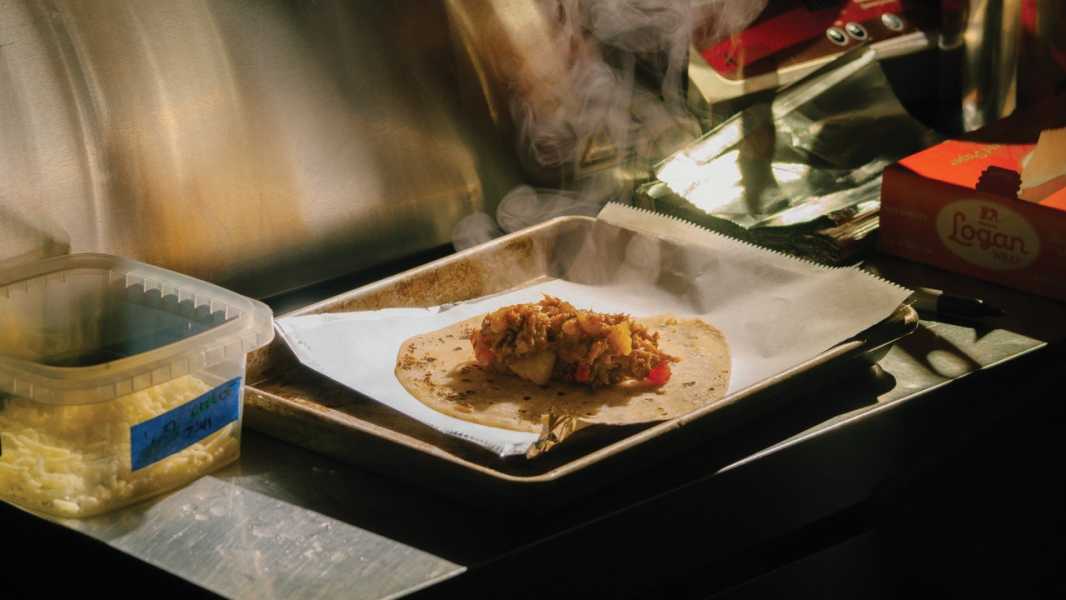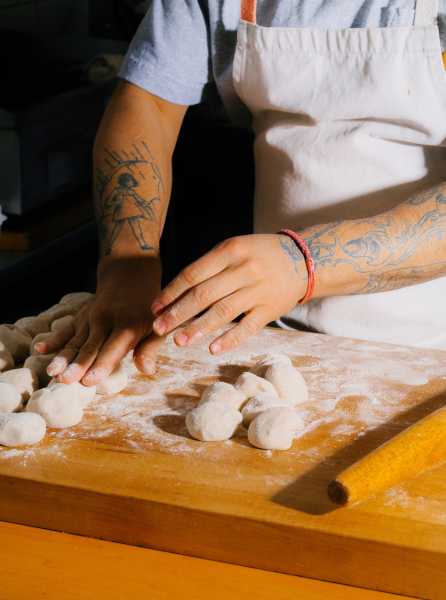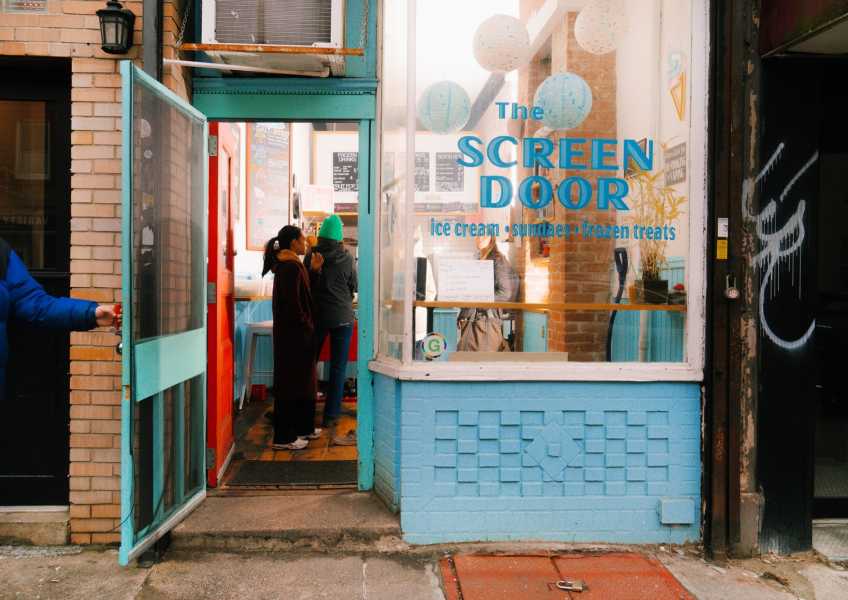
Save this storySave this storySave this storySave this storyYou’re reading the Food Scene newsletter, Helen Rosner’s guide to what, where, and how to eat. Sign up to receive it in your in-box.
I think of myself as a morning person, but, still, I groaned and grumbled as I rolled out of bed before sunrise on a recent morning just to get breakfast. My destination was the Screen Door, a tiny ice-cream shop in Brooklyn’s Greenpoint that is currently serving as the host of Border Town, a peripatetic breakfast-taco pop-up. A friend had advised me to get there at eight o’clock on the dot, the moment the door opens, to insure that I absolutely, certainly, without fail would be guaranteed a taste of the chef Jorge Aguilar’s frijoles taco—a modest smear of refried beans and a bit of melted cheese on a blistery-fresh flour tortilla—which tends to sell out fast.
Some beans are worth waking up for. Aguilar’s frijoles refritos are made with pinto beans and lard in a two-day process: one for cooking the dried beans, another for stewing them down. The result is rich, earthy, and sweet. But the real star of the frijoles tacos are the tortillas, which Aguilar rolls out fresh as the orders come in. When you arrive at the front of the line—and there will almost certainly be a line—a cook will grab a just-made tortilla from a pile, scoop in a portion of refried beans and sprinkle on some cheese, then roll it up and let it all melt together into a gooey parcel of savoriness and warmth. Two or three make for an ideal breakfast.
Border Town at the Screen Door
145 Driggs Ave., Brooklyn
(Tacos $5.)
Unlike corn tortillas, flour ones are most often shaped by hand, instead of flattened in a manual press. Watching Aguilar work, while you wait for your order, is hypnotic: the slap of a portioned round of dough onto a wooden surface, the hush-hush of his tapered rolling pin bringing the disc to the proper thinness. After each tortilla is rolled, Aguilar will look at it appraisingly, maybe stretch it a bit more, or give it a little pizzaiolo-style twirl. From there, it’s on to an electric griddle, just a few seconds for each side, enough to cook the dough and let it speckle and blister in the heat. This is not fast food: the painstaking process means that your taco is ready when it’s ready. It also means that your tortilla will be so chewy, so tender, so steamy, that you won’t mind the wait. Fresh tortillas, in general, are so dramatically superior to their store-bought, mass-market counterparts that they’re almost an entirely distinct species, and this is especially the case when it comes to those made with wheat flour. If the only flour tortillas you’ve tried are the thick, Wonder Bread-ish rounds that come from the grocery store in a branded plastic bag, shelf stable and bleachy pale, you are owed a serious mind expansion. (Side note: for tortilla fixes at home, I’m in the habit of placing enormous online orders from Caramelo, a Lawrence, Kansas-based tortilleria whose Sonoran-style duck-fat flour tortillas are shipped frozen nationwide and are, to me, one of the world’s truly perfect foods.)

Jorge Aguilar, the owner of Border Town, makes fresh tortillas using an ultra-fine, ultra-soft Sonoran wheat flour that his parents help him source from Mexico.
Aguilar, who operates Border Town with his partner Amanda Rosa, grew up between the U.S. and Mexico, in the transborder agglomeration Calexico-Mexicali. The simple, almost minimalist tacos de guisado that he and Rosa serve at Border Town are popular throughout Mexico, though they’re not that common in New York City, where diners tend to expect heaping, multilayered creations with a mix of textures and temperatures. Guisado refers to a braise or stew, something cooked and soft; Border Town rolls its fillings up, giving the tacos the look of small, slim burritos. There’s no seating at the Screen Door, which means your order has to be taken to go rather than consumed on the spot. Perhaps that’s a feature, not a bug: when I asked Aguilar about the tacos de guisado that he grew up eating, he described a time when he lived on the U.S. side of the border and would ask his friends who lived in Mexico but worked in California to bring him tacos for lunch. “They used to get in line to cross over around five in the morning,” he said, “and I wouldn’t eat the tacos until noon. Those tacos were like heaven to me.” On one visit to Border Town, I devised a test: I scarfed down one potato-and-chorizo taco almost the instant Rosa handed me my bag: terrific. Back at home, I unwrapped another one, after the tortilla and its filling had been steaming inside their foil blanket for close to an hour. Sure enough, the taco was extra warm and yielding, and the flavors—the flour and the char, the faint and sweet minerality of the potato, the spice and fat of the chorizo—all blurred together, a perfect harmonic chord.

Border Town is popping up three times a week at Screen Door, an ice-cream shop in Greenpoint, and on Sundays at the Clinton Hill coffee shop Commune.
Aguilar and Rosa generally offer three guisados each day, the frijoles taco among them. My favorites, of those I’ve tried, include egg and potatoes; chile colorado (pork shoulder slow-braised with mild chiles); chicharrón (fried pork skin stewed in a salsa roja); and a velvety mashed-potato filling spiced with a bit of chorizo. Aguilar makes the guisados offsite, in a commercial kitchen, and prepares the tortilla dough in bulk at home. He began experimenting with a flour-tortilla recipe during the pandemic, when he and Rosa (his partner in life as well as in business) found themselves among the city’s thousands of suddenly unemployed restaurant workers. After failing to replicate the tortillas of his childhood using American flours, he began trying Mexican brands, and found perfection in Bonfil, an ultra-fine, ultra-soft flour made from unbleached Sonoran wheat. The only problem was that Bonfil isn’t distributed in the United States. So Aguilar roped in his parents to jerry-rig a distribution system: his father, who lives in Mexico, buys cases of the flour and hands them off to Aguilar’s mother, who lives in California. She boxes them up and mails the crucial ingredient across the country to her enterprising son. (Lard, the other essential ingredient, Border Town sources closer to home, from Williamsburg’s new-wave butcher shop Marlow & Daughters.)
Helen, Help Me!
E-mail your questions about dining, eating, and anything food-related, and Helen may respond in a future newsletter.
Aguilar and Rosa told me that their goal, eventually, is to turn Border Town into a brick-and-mortar business. For now, they’re in residency at the Screen Door through early March, three days a week, and also have a Sunday pop-up at Commune, the Clinton Hill coffee shop. It begins at the far more humane hour of 10 A.M., and consequently has a slightly more sceney vibe. Border Town offers no drinks, no sides, no extras at either location—just tacos de guisado, plus little containers of spicy salsa verde and a brick-hued salsa roja, for a jolt of heat and brightness against the tacos’ mellow, pork-fatty depth. There is generally one vegetarian filling available, like rajas con papas, potatoes with onions and green bell pepper, and Aguilar makes a very small number of tortillas with avocado oil, for those who know to ask for them. “But we’re not trying to advertise that we’re vegetarian friendly,” Rosa told me. “We love the tortillas made with pork lard. That is our product.” ♦
Sourse: newyorker.com